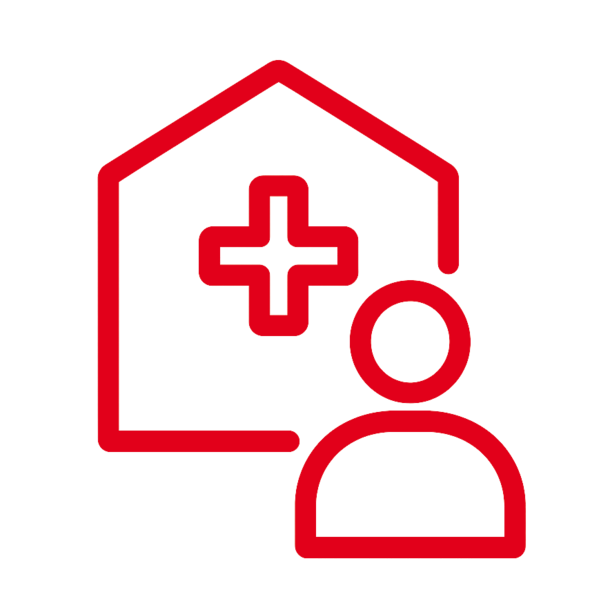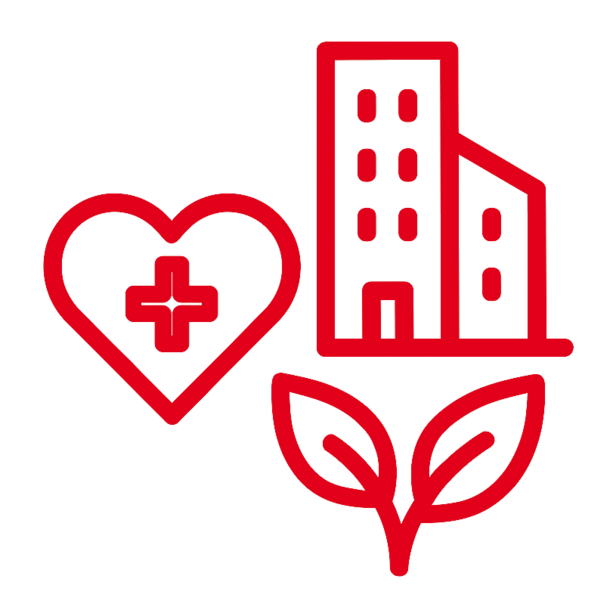Health Care Research & Community Health - Areas of expertise
Areas of expertise at Bochum University of Applied Sciences in the research focus area Health Care Research & Community Health.
Professionalisation of Healthcare Professions

Bochum University of Applied Sciences deals with issues relating to the professionalisation and further development of healthcare professions. These include nursing, midwifery, therapeutic professions and community health, which are taking on increasingly diverse and complex tasks in response to changing requirements in the health care sector. Professionalisation encompasses the expansion of technical qualifications and skills and a stronger focus on scientifically based concepts that contribute to ensuring quality of care and patient safety. Taking into account the needs of different target groups is of central importance in this context.
In this context, concepts and measures based on current scientific findings are developed and tested and systematically reviewed in practice. Such approaches help to anchor evidence-based structures in the healthcare professions and further expand their relevance for high-quality care.
Professionalisation also includes the (further) development of an independent professional identity with clearly defined roles and responsibilities, particularly in interprofessional collaboration, as well as active participation in shaping health care.
Health Care

Research in the field of healthcare focuses on improving the structures, processes and quality of healthcare provision in our healthcare system under everyday conditions. The term is deliberately broad and covers all areas of care, from treatment and rehabilitation to nursing, and in particular prevention and health promotion. In these contexts, healthcare research is interdisciplinary in nature and examines not only individual patient experiences, but also target group-specific care models and the efficiency of the healthcare system.
A particular focus is placed not only on equal and fair access to healthcare, but also on examining the extent to which disparities in care lead to health inequalities and the consequences this has for people. In addition, the interdisciplinary approach aims to strengthen people's health literacy, support vulnerable groups and thus improve health for everyone in a community.
Urban Health

Urban health deals with the health of various communities in urban living spaces and is therefore also referred to as urban health in relation to international discourse.
On an analytical level, various factors that influence health are identified with regard to the urban conditions in which people live. These can be considered from a physical-material, socio-ecological, institutional or cultural-symbolic perspective and can be partially localised. Urban health is not only analytical, but also implementation-oriented and practical, with the aim of making cities healthy for all residents.
The focus is on instruments and measures that are also aligned with the Sustainable Development Goals (in particular SDG 3 and 11) and pursue greater equality of opportunity and environmental justice in cities. An intersectional and global justice perspective is therefore often adopted. The WHO's ‘Health in All Policies’ model guides our actions, stating that it is not only the health sector that promotes health, but also other policy areas such as urban development, mobility, the environment and education. This integrates the logic and instruments of various policy areas and social actors, which are anchored in research and teaching in various departments at Bochum University. Urban health is thus an integrated approach that supports a human-centred approach to sustainability goals at HS Bo.
The spectrum of scientific disciplines and methods in the context of urban health is broad due to the frequently used systems science approach. The transdisciplinary generation of knowledge and orientations through science, practice and diverse communities is seen as a central methodological approach and contributes to the transfer goals of Bochum University. Participatory action-oriented research approaches are central to this.
Person-centered Care

Person-centred care is a key factor in health-related research at Bochum University of Applied Sciences. The following principles are of central importance in this context:
- Diversity sensitivity, i.e., consideration of diverse groups and individual health needs;
- equal health opportunities in the sense of inclusion, low-threshold access and accessibility for different target groups at different levels of care;
- life-world orientation and context sensitivity in the sense of designing health-promoting living conditions oriented towards different realities of life, especially for marginalised communities;
- Resource orientation and empowerment in the sense of supporting individual strengths and encouraging self-empowerment.
These principles are taken into account in health-related research at Bochum University of Applied Sciences through participatory and collaborative approaches, as well as through the appreciation and strengthening of real-world knowledge in decision-making on health issues. New job profiles and application contexts are being developed to create low-threshold access and ensure barrier-free, equitable participation in healthcare. The aim is to take individual realities and health-related needs into account based on a holistic and interdisciplinary understanding of care.

